
“Fired? Are You Sure?”: New Management Fires The Best Employee In The Company, Regrets It Almost Immediately
A change in a company’s ownership can transform it into an entirely different business. And not always for the better.
One recent post on the popular r/ProRevenge subreddit by user Vonadler is a perfect example that forcing policy on employees you know very little about can seriously backfire.
It begins by introducing the hero of the story. An elderly engineer who had become an integral part of the organization.
The man was the star of the show. He produced results, trained his colleagues, and made sure everything was running smoothly.
However, after the company was sold and new managers came in, they wanted to steer the ship in a new direction and began to make some of the crew uneasy. Including their most important engineer.
The conflict grew and the managers made up their minds to fire him as soon as an opportunity presented itself. But what the bosses didn’t expect was that they would beg him to come back after just a few days.
Image credits: Field Engineer (not that actual photo)
Sadly, there’s no shortage of bosses mismanaging their teams. And one doesn’t have to look far for proof. 2018 research from Gallup, for example, revealed a series of alarming stats.
78 percent of employees, for example, don’t believe their leaders have a clear direction for the organization. Yes, there might be extensive communication plans, presentations, and memos, but in reality, few employees think their leaders know where their organization is headed, and only 15% of employees strongly agree the leadership of their organization makes them feel enthusiastic about the future.
Researchers think one reason may be that most leaders do not include a significant number of people in shaping the vision of their company. When people feel like they aren’t a part of the process, they are less enthusiastic about the outcome.
Also, only 14% of employees strongly agree that the performance reviews they receive inspire them to improve.
One cause is that performance conversations happen so infrequently and modern businesses change so quickly. So when managers and employees finally sit down to talk, few of the goals or measurements make sense anymore.
Then there’s the workload. 67% of employees say they are sometimes, very often, or always burned out. And that’s a problem. Employees who are very often or always burned out are 63% more likely to take a sick day and 23% more likely to visit the emergency room.
It also affects employee performance, retention, career growth, and even family life. So kudos to our engineer who fought overtime. “Work” or whatever you want to call this culture, it’s not something to be celebrated.
Managers should be very aware of these numbers because according to Joblist’s 2022 Job Market Trends Report:
- 3 out of 4 full-time employees are planning to quit their job this year;
- 79% of employed job seekers believe that they can make more money by switching jobs than staying put in the current market.
Plus, our elderly gentleman isn’t a standalone example. A few days ago, The Washington Post reported that, “Goldman Sachs estimated last fall that more than half of those who had left the workforce during the Covid era’s Great Resignation were over 55.”
Robert Kelley, who is a professor of management at Carnegie Mellon University’s Tepper School of Business, told Forbes that, “The Covid pandemic is producing a once in several generations seismic shift in the work world—from what work do we focus on, to who does that work, to where is the work performed, to how much life purpose do workers derive from their work”
Kelley prefers to see The Great Resignation as the first shock-wave of what he called the ‘Big Sort’ that will have trailing aftershocks. “All echelons—from CEOs to front-line workers—are sorting out their relationship with work and how work fits into their overall life-work balance, as well as how much they want to get paid for their work.”
Sounds like our engineer was ahead of the game and had already had his answers. The managers were just playing catch-up.
People thought the man handled the situation beautifully
707Kviews
Share on FacebookUnions, people. You want better? Group of labor vs management has been shown to work quite well throughout the world and recent history. If you pay $100/year to a union that helps you get an extra $1600 a month at your job, and better safety, and health care.... Seriously, what's the problem? .... I will never understand how people got conned into thinking unions cost more than this absurdity we call "working conditions" in America. Rant over. peace out.
Well said! I can tell you how people got conned: by being given propaganda by powerful people who stand to lose from workers having protection.
Load More Replies...I was going to say the same thing! 55 is elderly? Given life expectancy in the US, for example, that would mean that for about 30% of a person's lived live, they would be identified as elderly.;
Load More Replies...In short: Unions work, Labor laws work. In normal societies employees are protected against idiotic employers. Which contradicts the believe that unions are only out to destroy the economy by demanding absurd working conditions and extravagant wages.
Yeah...but unions aren't always that great. For example, auto unions historically haven't given one tiny crap about the environment. They have never demanded automakers create EVs or any sort of environmentally friendly vehicles. Also, many unions don't even work that well or even care that much. Just look a when Ford announced the Mustang Mach E would be made in another country rather than in America. The union complained a bit, and that's it! lol No strikes, no hardball, nothing!
Load More Replies...Typical Swede. Apologizes for English being their second language, then proceeds to write better than most Americans and Brits.
I was thinking the same thing! Their English is very good!
Load More Replies...So much detail for a “friend’s father”. Reads like a workplace fiction. I like the happy ending though. Well written. 👍
I'm an American and I absolutely hate American corporate culture. Just let me do my job and go home. If I wanted to do silly stuff at work I would have stayed at the preschool
So right. I just want to do my job, I'll socialize with people I like but don't force me to attend some recognition or team building exercise seminars. That always makes me so uncomfortable and don't love the company any more than before.
Load More Replies...I have never experienced this “American” corporate culture of clapping and cheering.
i have. morning meetings where the managers talk about how great the company is and how we're the backbone and we do stupid things like a chant or stomp our feet and then yell go team.
Load More Replies...Management tried to install American company culture in Sweden? BAHAHAHAHAHAHA! No. Take your fake cheering elsewhere. America, for example
I’m 61, and even in my twenties and thirties I hated all the b******t corporate pep rallies we were forced to attend, though it did let you know who the real company asskissers were. The time wasted on that b******t only made me that same amount of time behind on my work, so I’d have to scramble to catch up when we were finally allowed to leave. Instead of wasting money on the goddamned speaker and handouts and crap, how about giving us a raise? You pay me s**t wages, so you shouldn’t expect much, if any, enthusiasm out of me. You want more participation and enthusiasm? F*****g pay me.The level you’ll get will be commensurate with the amount of my paycheck. Didn’t make me popular with management. So it seems that this late Boomer (1960), who’s actually more like GenX, had a Millennial/GenY attitude toward work back before/when those people were born.
"My friend's father." This is very detailed third-hand information! I think the poster is being coy...
Oh god, how I hate when American-blood-sucker companies try to apply that MO an established European firms, which they've brought (more or less recently)! We are skilled workers, even without a university degree, we have learned our profession for around 3! years to even be allowed to work on a certain task... Yes right, 3 fricking YEARS and NOT 6 sodding WEEKS. Not to mention the skilled workers who achieved a bachelor/master degree in engineering afterwards! Just let me tell you one thing: your poor "team-building" approaches, hollow "cheers for commitment", cringeworthy "safety-videos" to rise more safety awareness are echoing in the dark...!!! We have established this long time ago, got better safety rules than the US can ever think of and we don't need to grab our hands and playing 'round-the-rosie' to feel like a team...! Its the US-American approach that more and more destroies those things while leaving nothing worse behind!
I know this isn't the point but the friends father sounds cool!
And then everyone clapped in the comments. Because who doesn't love a good, fake story for Karma on Reddit?
It always blows my mind at how stupid managers can be. And yet, I've seen many of them. Good managers are very rare. And, in my experience, even the "good" managers have no problem lying. And they're all quite good at lying, too. Management makes me sick in general.
Sounds exactly how Boeing f****d up their company AND killed innocent people and how PG&E in California f****d up their business and killed innocent people. Moral of the story, greed usually results in self destruction loss of a asl that’s good and lots of innocent dead people
I worked at a college dealing with graduation. I was the person who determined who was and wasn't eligible to graduate. I did the exact amount of work as 5 people who worked on another campus. I had to take medical leave, but the Registrar, hated me, and decided to give me a hard time. That night I cleaned out my desk, leaving my notice which would occur just as soon I was due to be back from leave. They had a very hard time tracking me down as I had left the country. They discovered quickly how much work I had done. They hired 4 people to replace me. I still gloat.
This is probably a fantasy. We fired a guy last year who thought he was indispensable. He was very experienced, skilled and knowledgeable but required a full time babysitter to control his arrogance and assholery. He actually told me that it was only temporary and he was sure we’d come crawling back and he’d only accept double his salary because no one knew more than him. Guess what? We had a few tough weeks but are fine without him. That’s the reality in these situations - there’s rarely an indispensable person.
You state above that you welcome corrections, as English is not your native language. Allow me please to correct your use of the word "cringe". Cringe is a verb, an action word. Cringe is something you do, not an adjective describing a situation. The correct form is "cringe-worthy", as in, that was a cringe-worthy situation when they tried to make the engineer participate in team building exercises. Enjoyed reading your article.
This story is a clear example of why the corporate giants hate unions. Good unions like this one stood up for this man. They didn't let this company screw him over.
A 55-year-old employee is “elderly?”😆😆😆 What 20-year-old wrote this article? Still, a great story.
Why do managers/new management still consider the way to show they did something, brought about change, make noticeable progress etc is only by being miserable. All they had to do was listen to the unspoken words and read between the lines. I'm sure the previous owners had the last laugh and made a big profit while dealing with such stupid new larger corporate smugs...
I have that same power working in HVAC. There are so few people left with any knowledge or skills that I can walk around with "the worst attitude ever", refuse to fo certain jobs and call out anytime without getting fired. However, I still can't get paid worth a s**t.
Pretty pathetic to cross out the word S**T but arsehole is ok? Hahahahhhahhhh
Christ even my typing S h I t. Gets blocked 🤣🤣🤣🤣🤣
Load More Replies...I was that person at my job who could shift the culture. My employers made sure to denigrate me at every turn and even starting sending out emails to my department that did not include me. The manager who did this was forced to early retire. I hope he got covid.
Big firm had to cut on costs and told my friends dad (50+) he'd be one of the people to be set free. He asked for an interview with the Management that was granted to him. When the Management sat before him he asked: " Do you know what's my job in this firm?" None of them could answer it, they just fired at will but without knowledge... So he told them. It dawned on them he really was the only engineer capable of doing his job in the whole firm. Not only wasn't he fired, he demanded a raise. I'm sure they look twice after that, before trying to fire an essentional worker.
Not exactly the same but I was the guy that did everything. Apparently that still wasn't enough because I was kept back after a meeting and told I needed to do more. When it got out what I was told others were incredulous. They found out just how much I did when I took another job a few months later. They begged me to stay. Made an offer letter with a significant pay raise among other things. I left, and a chain reaction happened behind that with others leaving. The company eventually folded, and all because the owner couldn't appreciate the people he had working for him.
Load More Replies...I have seen this a few times with USA based and run companies operating in Europe. They do not seem to understand that if you are operating in the UK or EU you have to abide by the laws set by those places, and in terms of things like employee rights and data protection the UK and the EU are far, far stricter than the USA.
This is why I support Unions, not labor laws or government regulation. If a company is acting horribly, the workers can take care of it themselves (through unionization, striking, or working for a competitor). No need to get the government involved.
You don't seem to understand the role of Unions in Europe. The point of Unions here is that they force companies to abide by the law. If there is nothing in legislation that stipulates what rights employees have then the unions have no power. It is because of labour laws and regulation that unions are so effective. The other benefit of labour laws and regulation is that everyone is protected by them whether or not they are union members. Everyone has access to industrial tribunals and they do not need to rely on a particular union in order to benefit from laws and regulations. This also has the benefit of limiting the power of trade unions, unlike in the USA where they often seem akin to cartels or racketeering organisations.
Load More Replies...Who wrote this narrative? A teen? 55 is far from elderly and the article itself proved that age discrimination is bs.
Assignment: Write me a story where you tone down the red flags that normally give away a right-wing, ego-maniac protagonist averse to any "liberal" corporate culture, and give him just enough curmudgeony-style platitudes to come off as a victim hero...
Damn. Never ever clapped for even a work celebration of a birthday. Definitely never any daily cheering in an office. Also yes unions CAN be good, but they can also be rather impotent and "useless". The PART-TIMERS declaring and voting for unions at STARBUCKS however, is just plain idiotic. Can you imagine some snotty teens at McDonald's to demand unions next? You better hope they don't or cheaply made bin food will have $20 combo prices.
Yeah right. Because workers in the industries where the worst treatment happens definitely shouldn't have unions. You know what - if the price of your cheap burger is that employees are paid badly and treated like s**t, then the cheap burger has to go. Bad luck. Eat fewer burgers.
Load More Replies...Unions, people. You want better? Group of labor vs management has been shown to work quite well throughout the world and recent history. If you pay $100/year to a union that helps you get an extra $1600 a month at your job, and better safety, and health care.... Seriously, what's the problem? .... I will never understand how people got conned into thinking unions cost more than this absurdity we call "working conditions" in America. Rant over. peace out.
Well said! I can tell you how people got conned: by being given propaganda by powerful people who stand to lose from workers having protection.
Load More Replies...I was going to say the same thing! 55 is elderly? Given life expectancy in the US, for example, that would mean that for about 30% of a person's lived live, they would be identified as elderly.;
Load More Replies...In short: Unions work, Labor laws work. In normal societies employees are protected against idiotic employers. Which contradicts the believe that unions are only out to destroy the economy by demanding absurd working conditions and extravagant wages.
Yeah...but unions aren't always that great. For example, auto unions historically haven't given one tiny crap about the environment. They have never demanded automakers create EVs or any sort of environmentally friendly vehicles. Also, many unions don't even work that well or even care that much. Just look a when Ford announced the Mustang Mach E would be made in another country rather than in America. The union complained a bit, and that's it! lol No strikes, no hardball, nothing!
Load More Replies...Typical Swede. Apologizes for English being their second language, then proceeds to write better than most Americans and Brits.
I was thinking the same thing! Their English is very good!
Load More Replies...So much detail for a “friend’s father”. Reads like a workplace fiction. I like the happy ending though. Well written. 👍
I'm an American and I absolutely hate American corporate culture. Just let me do my job and go home. If I wanted to do silly stuff at work I would have stayed at the preschool
So right. I just want to do my job, I'll socialize with people I like but don't force me to attend some recognition or team building exercise seminars. That always makes me so uncomfortable and don't love the company any more than before.
Load More Replies...I have never experienced this “American” corporate culture of clapping and cheering.
i have. morning meetings where the managers talk about how great the company is and how we're the backbone and we do stupid things like a chant or stomp our feet and then yell go team.
Load More Replies...Management tried to install American company culture in Sweden? BAHAHAHAHAHAHA! No. Take your fake cheering elsewhere. America, for example
I’m 61, and even in my twenties and thirties I hated all the b******t corporate pep rallies we were forced to attend, though it did let you know who the real company asskissers were. The time wasted on that b******t only made me that same amount of time behind on my work, so I’d have to scramble to catch up when we were finally allowed to leave. Instead of wasting money on the goddamned speaker and handouts and crap, how about giving us a raise? You pay me s**t wages, so you shouldn’t expect much, if any, enthusiasm out of me. You want more participation and enthusiasm? F*****g pay me.The level you’ll get will be commensurate with the amount of my paycheck. Didn’t make me popular with management. So it seems that this late Boomer (1960), who’s actually more like GenX, had a Millennial/GenY attitude toward work back before/when those people were born.
"My friend's father." This is very detailed third-hand information! I think the poster is being coy...
Oh god, how I hate when American-blood-sucker companies try to apply that MO an established European firms, which they've brought (more or less recently)! We are skilled workers, even without a university degree, we have learned our profession for around 3! years to even be allowed to work on a certain task... Yes right, 3 fricking YEARS and NOT 6 sodding WEEKS. Not to mention the skilled workers who achieved a bachelor/master degree in engineering afterwards! Just let me tell you one thing: your poor "team-building" approaches, hollow "cheers for commitment", cringeworthy "safety-videos" to rise more safety awareness are echoing in the dark...!!! We have established this long time ago, got better safety rules than the US can ever think of and we don't need to grab our hands and playing 'round-the-rosie' to feel like a team...! Its the US-American approach that more and more destroies those things while leaving nothing worse behind!
I know this isn't the point but the friends father sounds cool!
And then everyone clapped in the comments. Because who doesn't love a good, fake story for Karma on Reddit?
It always blows my mind at how stupid managers can be. And yet, I've seen many of them. Good managers are very rare. And, in my experience, even the "good" managers have no problem lying. And they're all quite good at lying, too. Management makes me sick in general.
Sounds exactly how Boeing f****d up their company AND killed innocent people and how PG&E in California f****d up their business and killed innocent people. Moral of the story, greed usually results in self destruction loss of a asl that’s good and lots of innocent dead people
I worked at a college dealing with graduation. I was the person who determined who was and wasn't eligible to graduate. I did the exact amount of work as 5 people who worked on another campus. I had to take medical leave, but the Registrar, hated me, and decided to give me a hard time. That night I cleaned out my desk, leaving my notice which would occur just as soon I was due to be back from leave. They had a very hard time tracking me down as I had left the country. They discovered quickly how much work I had done. They hired 4 people to replace me. I still gloat.
This is probably a fantasy. We fired a guy last year who thought he was indispensable. He was very experienced, skilled and knowledgeable but required a full time babysitter to control his arrogance and assholery. He actually told me that it was only temporary and he was sure we’d come crawling back and he’d only accept double his salary because no one knew more than him. Guess what? We had a few tough weeks but are fine without him. That’s the reality in these situations - there’s rarely an indispensable person.
You state above that you welcome corrections, as English is not your native language. Allow me please to correct your use of the word "cringe". Cringe is a verb, an action word. Cringe is something you do, not an adjective describing a situation. The correct form is "cringe-worthy", as in, that was a cringe-worthy situation when they tried to make the engineer participate in team building exercises. Enjoyed reading your article.
This story is a clear example of why the corporate giants hate unions. Good unions like this one stood up for this man. They didn't let this company screw him over.
A 55-year-old employee is “elderly?”😆😆😆 What 20-year-old wrote this article? Still, a great story.
Why do managers/new management still consider the way to show they did something, brought about change, make noticeable progress etc is only by being miserable. All they had to do was listen to the unspoken words and read between the lines. I'm sure the previous owners had the last laugh and made a big profit while dealing with such stupid new larger corporate smugs...
I have that same power working in HVAC. There are so few people left with any knowledge or skills that I can walk around with "the worst attitude ever", refuse to fo certain jobs and call out anytime without getting fired. However, I still can't get paid worth a s**t.
Pretty pathetic to cross out the word S**T but arsehole is ok? Hahahahhhahhhh
Christ even my typing S h I t. Gets blocked 🤣🤣🤣🤣🤣
Load More Replies...I was that person at my job who could shift the culture. My employers made sure to denigrate me at every turn and even starting sending out emails to my department that did not include me. The manager who did this was forced to early retire. I hope he got covid.
Big firm had to cut on costs and told my friends dad (50+) he'd be one of the people to be set free. He asked for an interview with the Management that was granted to him. When the Management sat before him he asked: " Do you know what's my job in this firm?" None of them could answer it, they just fired at will but without knowledge... So he told them. It dawned on them he really was the only engineer capable of doing his job in the whole firm. Not only wasn't he fired, he demanded a raise. I'm sure they look twice after that, before trying to fire an essentional worker.
Not exactly the same but I was the guy that did everything. Apparently that still wasn't enough because I was kept back after a meeting and told I needed to do more. When it got out what I was told others were incredulous. They found out just how much I did when I took another job a few months later. They begged me to stay. Made an offer letter with a significant pay raise among other things. I left, and a chain reaction happened behind that with others leaving. The company eventually folded, and all because the owner couldn't appreciate the people he had working for him.
Load More Replies...I have seen this a few times with USA based and run companies operating in Europe. They do not seem to understand that if you are operating in the UK or EU you have to abide by the laws set by those places, and in terms of things like employee rights and data protection the UK and the EU are far, far stricter than the USA.
This is why I support Unions, not labor laws or government regulation. If a company is acting horribly, the workers can take care of it themselves (through unionization, striking, or working for a competitor). No need to get the government involved.
You don't seem to understand the role of Unions in Europe. The point of Unions here is that they force companies to abide by the law. If there is nothing in legislation that stipulates what rights employees have then the unions have no power. It is because of labour laws and regulation that unions are so effective. The other benefit of labour laws and regulation is that everyone is protected by them whether or not they are union members. Everyone has access to industrial tribunals and they do not need to rely on a particular union in order to benefit from laws and regulations. This also has the benefit of limiting the power of trade unions, unlike in the USA where they often seem akin to cartels or racketeering organisations.
Load More Replies...Who wrote this narrative? A teen? 55 is far from elderly and the article itself proved that age discrimination is bs.
Assignment: Write me a story where you tone down the red flags that normally give away a right-wing, ego-maniac protagonist averse to any "liberal" corporate culture, and give him just enough curmudgeony-style platitudes to come off as a victim hero...
Damn. Never ever clapped for even a work celebration of a birthday. Definitely never any daily cheering in an office. Also yes unions CAN be good, but they can also be rather impotent and "useless". The PART-TIMERS declaring and voting for unions at STARBUCKS however, is just plain idiotic. Can you imagine some snotty teens at McDonald's to demand unions next? You better hope they don't or cheaply made bin food will have $20 combo prices.
Yeah right. Because workers in the industries where the worst treatment happens definitely shouldn't have unions. You know what - if the price of your cheap burger is that employees are paid badly and treated like s**t, then the cheap burger has to go. Bad luck. Eat fewer burgers.
Load More Replies...
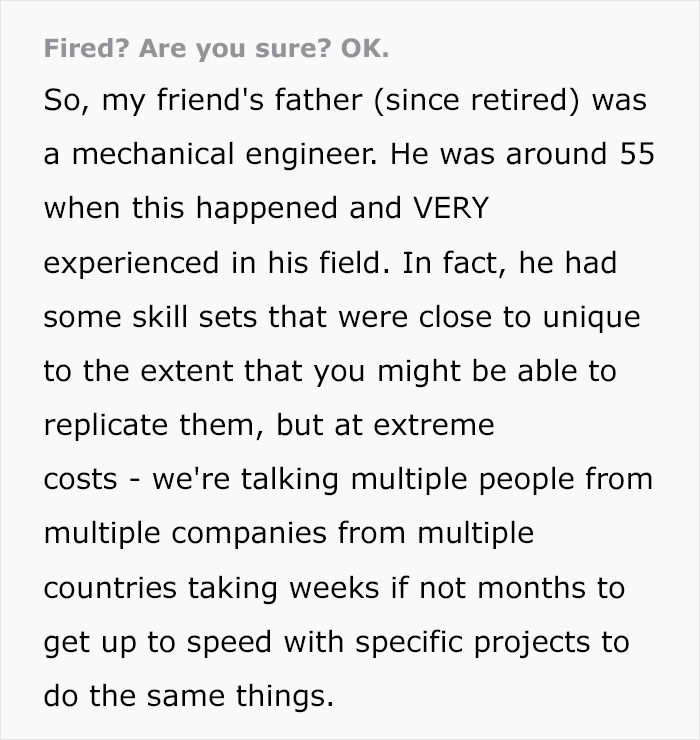
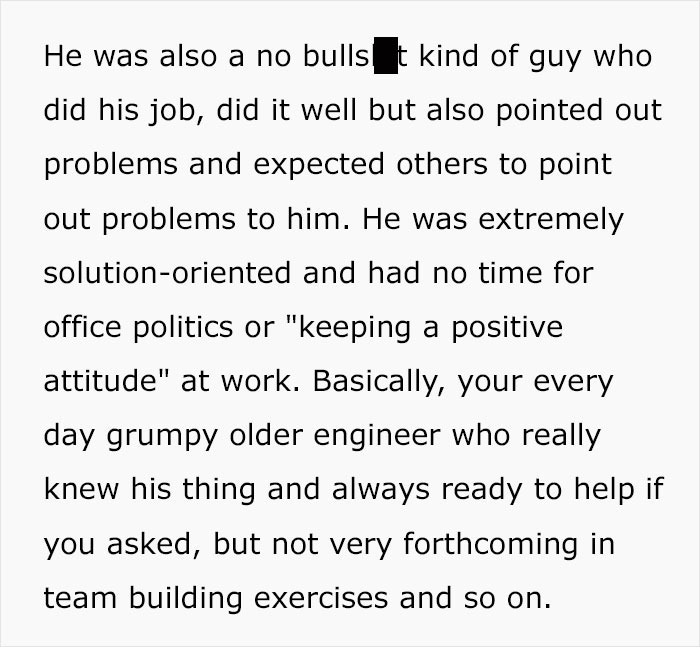
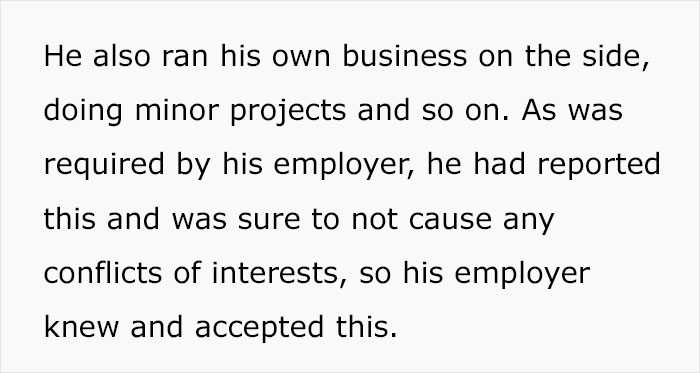
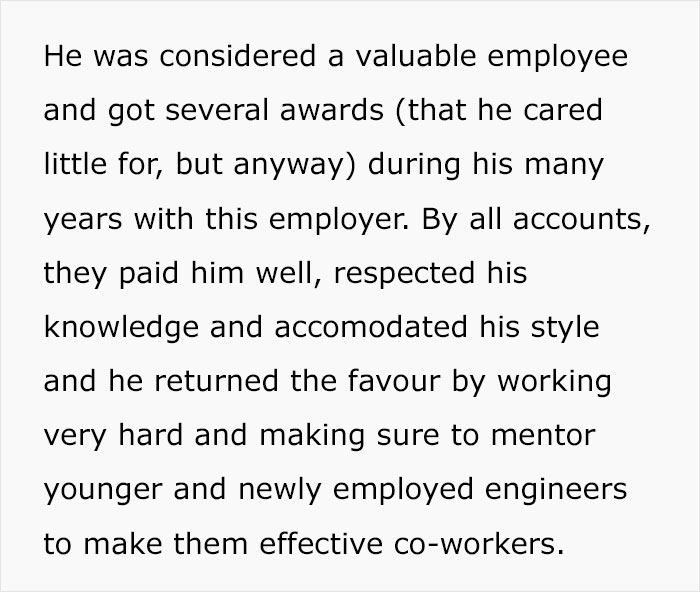
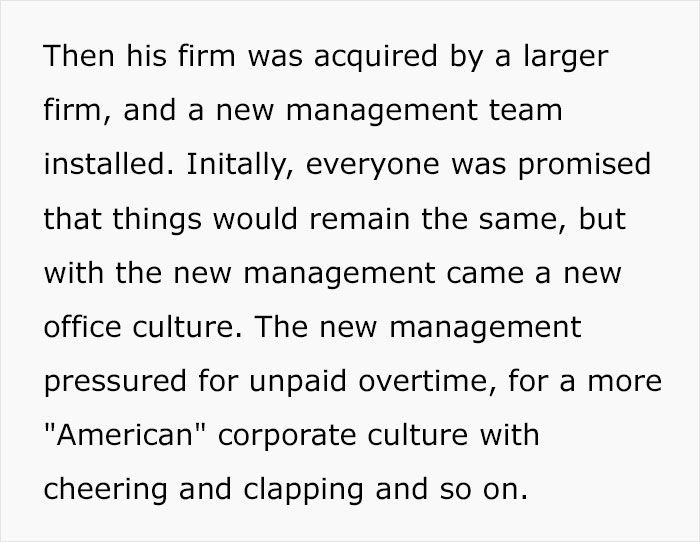
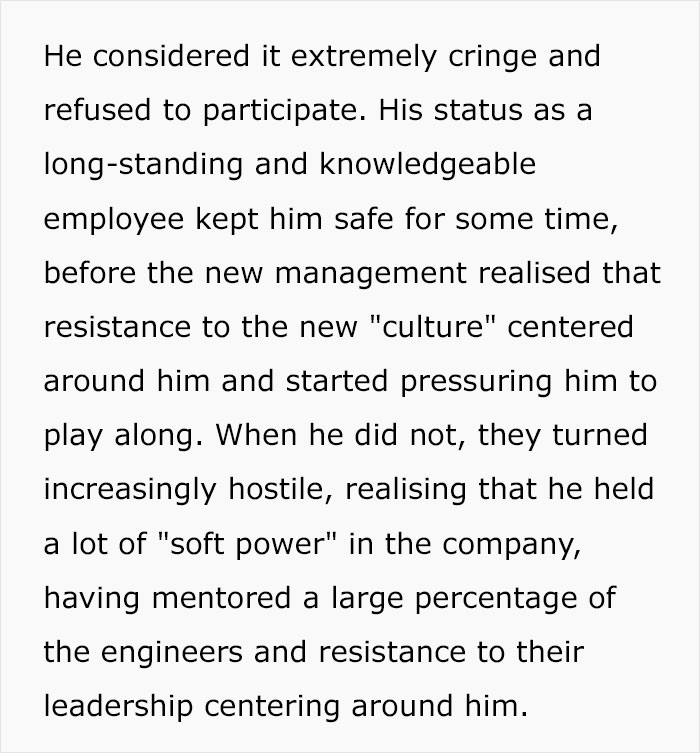
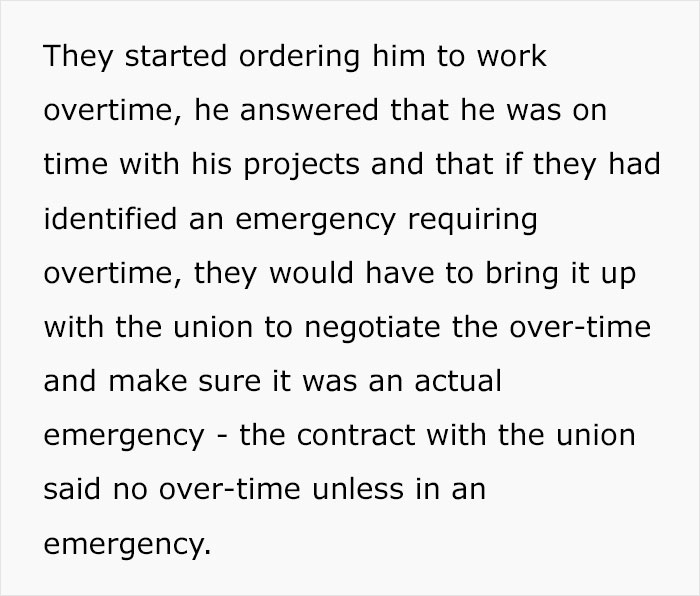
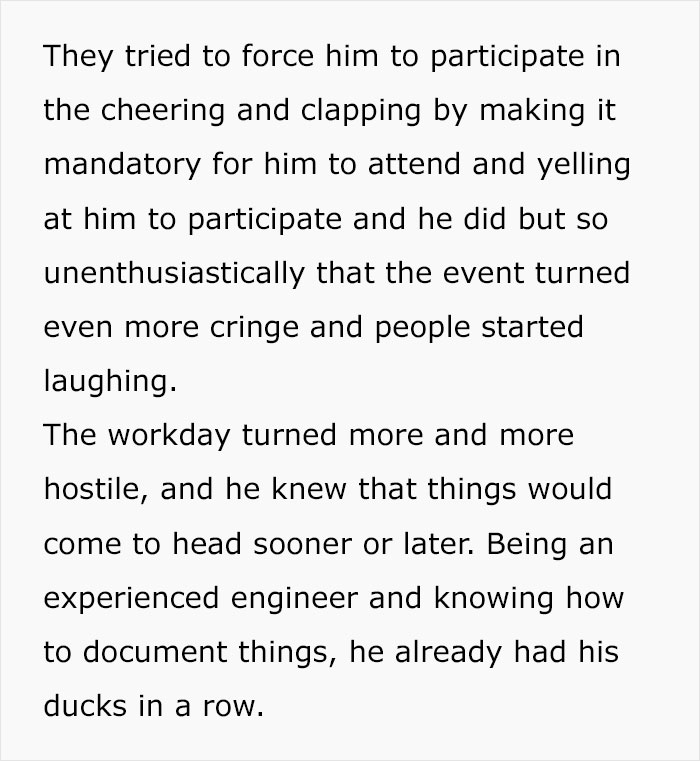

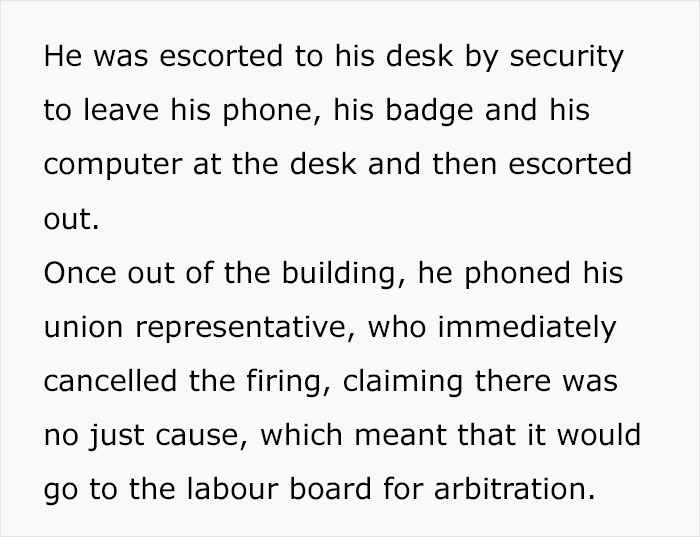
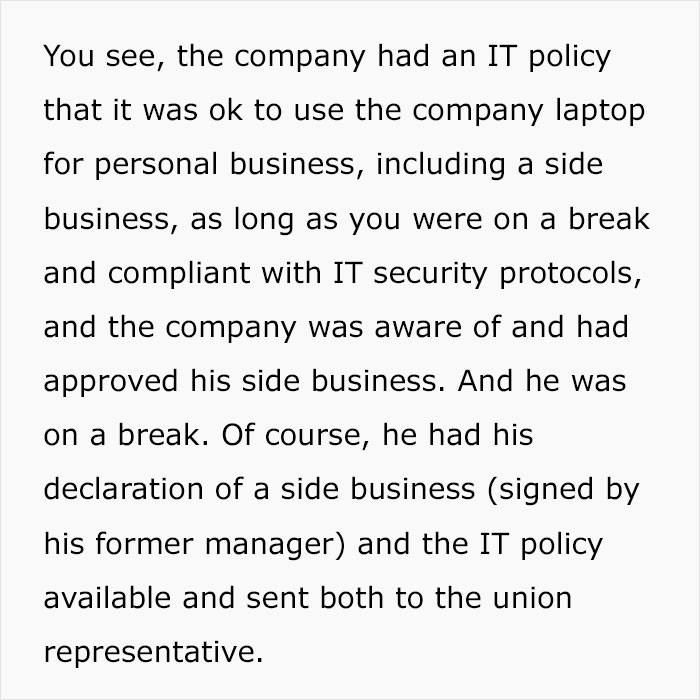


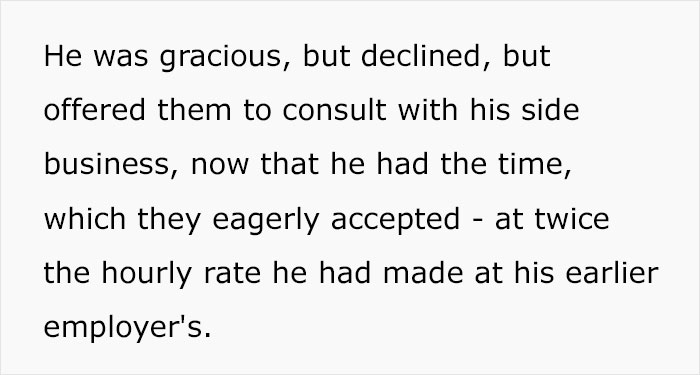
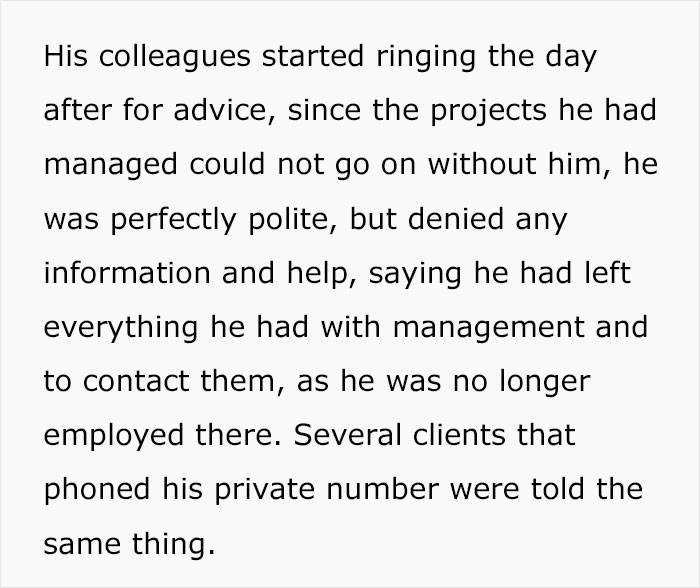
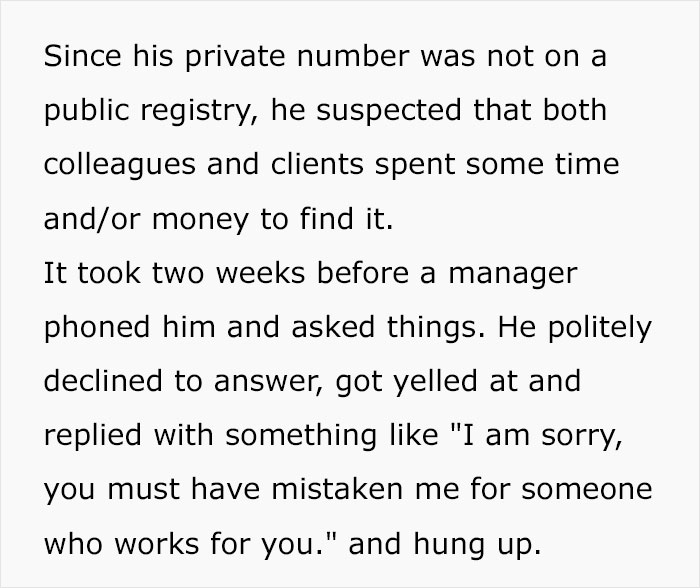
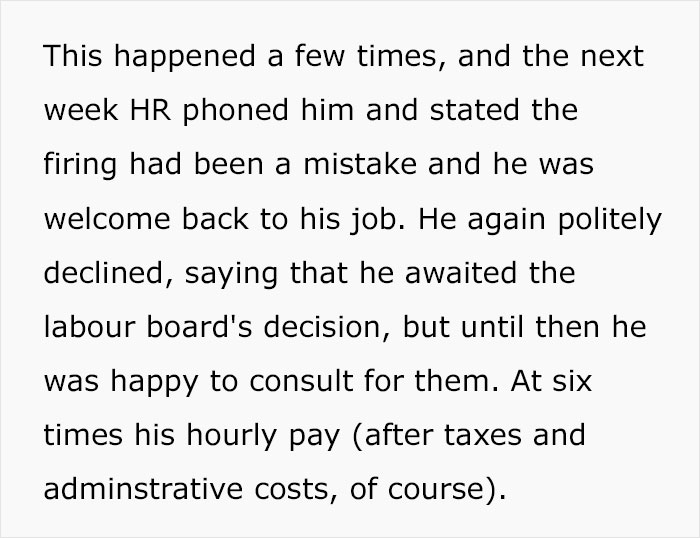
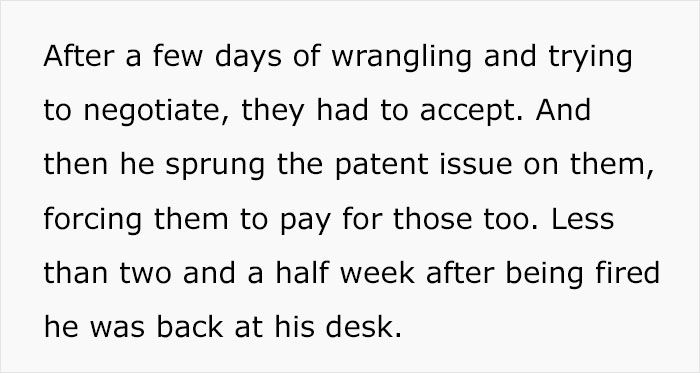
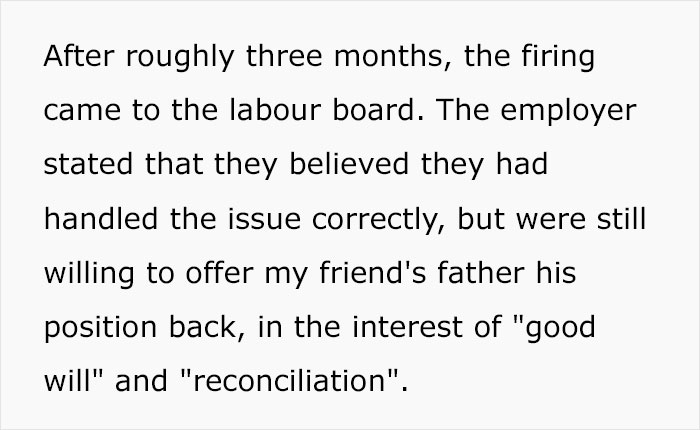
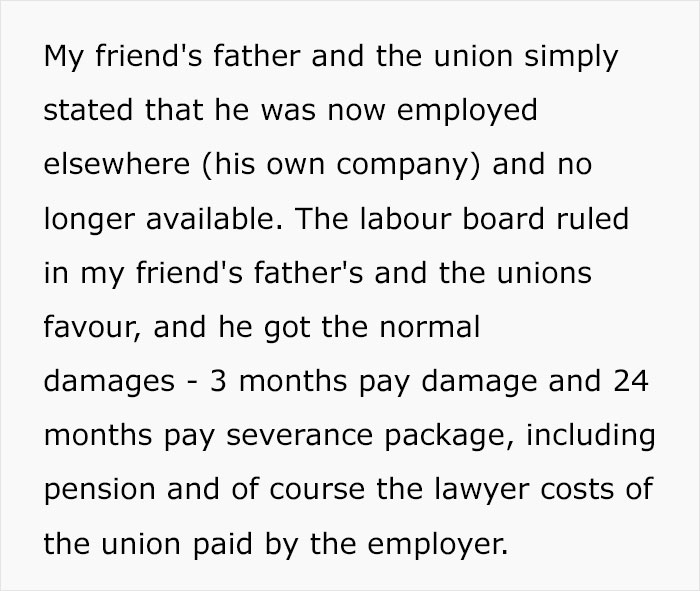
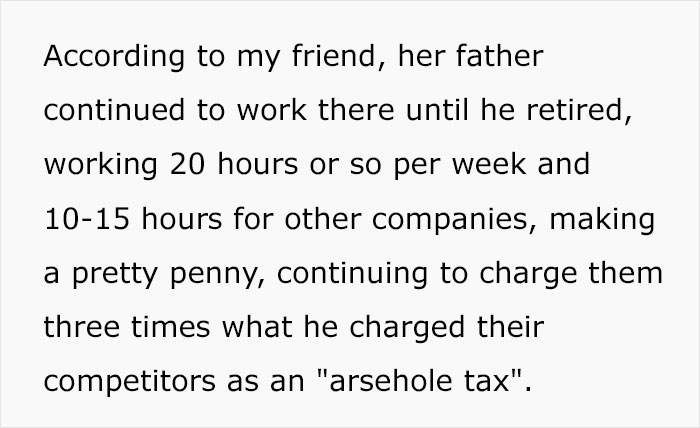
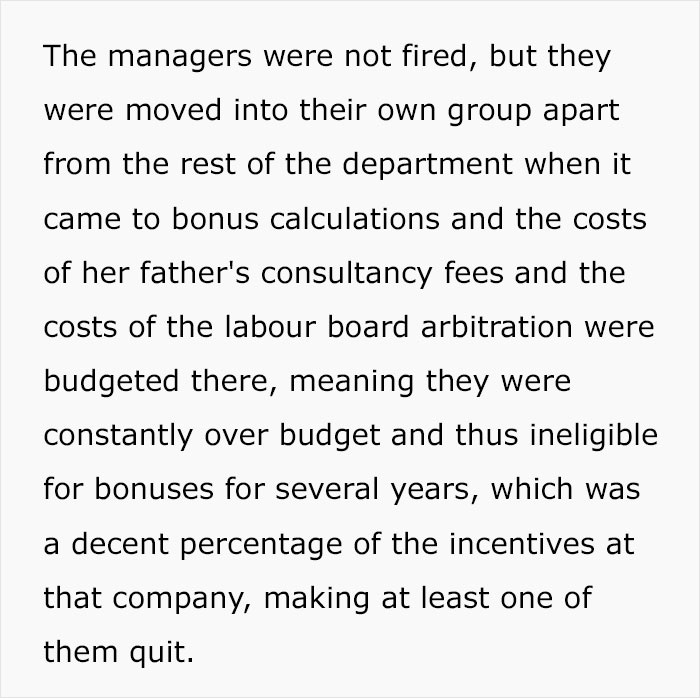

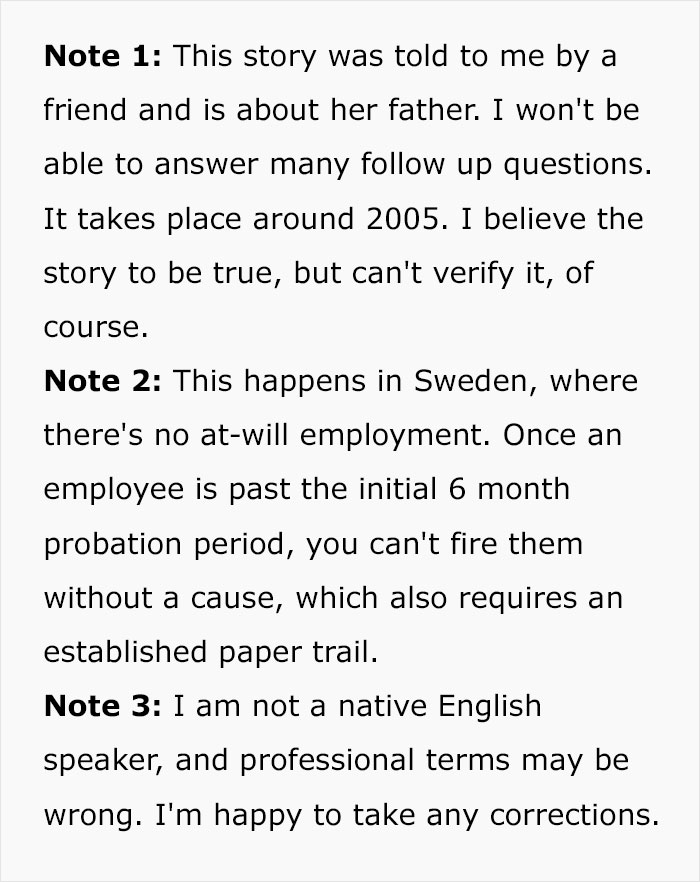

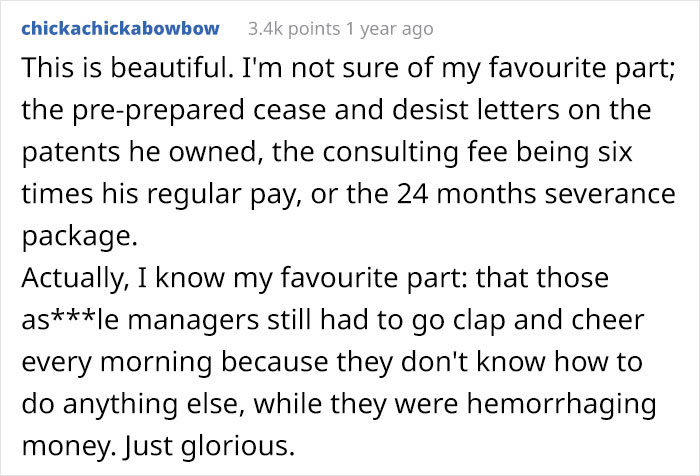



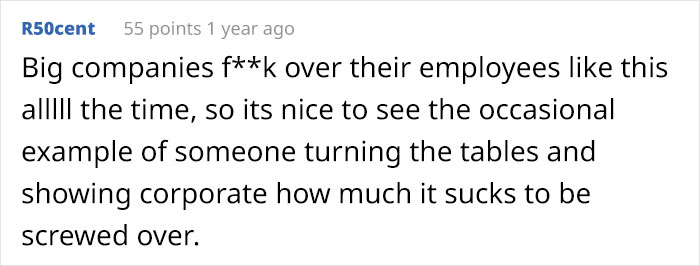

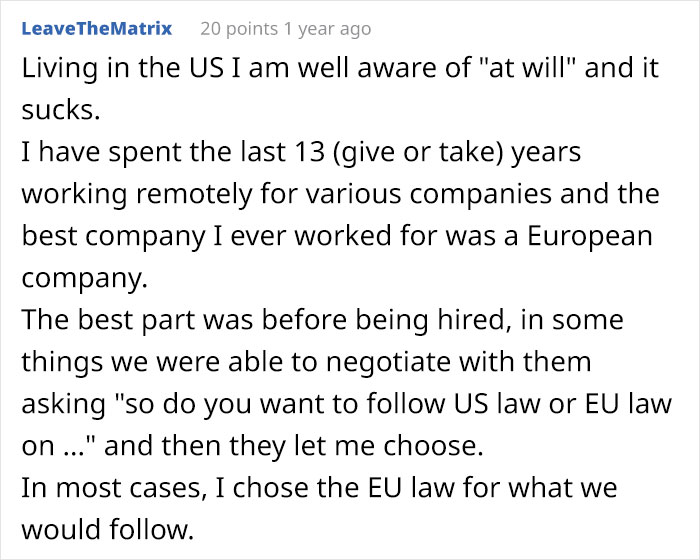
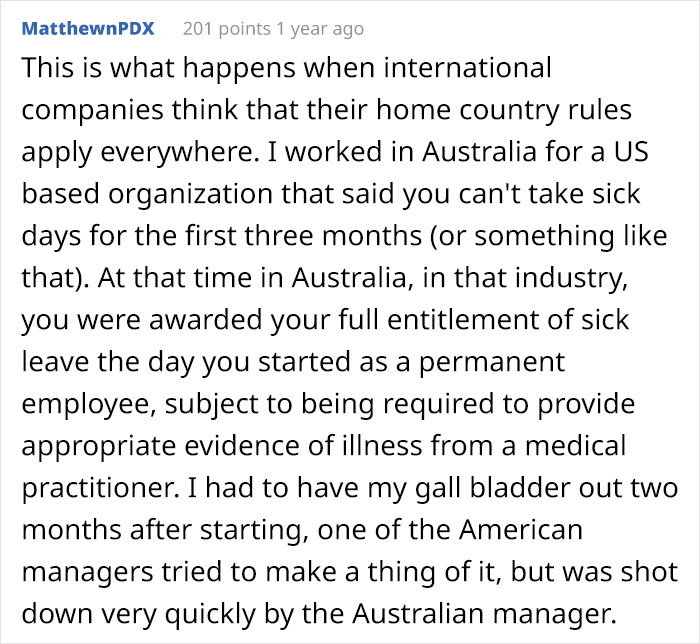





170
81